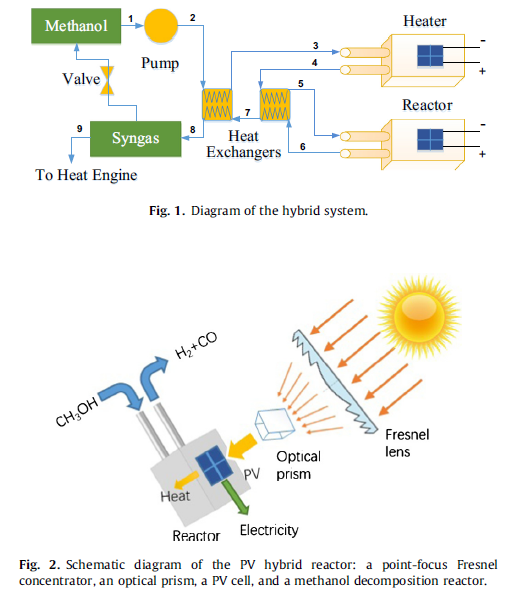A solar photovoltaic (PV) thermochemical hybrid system consisting of a point-focus Fresnel concentrator, a PV cell and a methanol thermochemical reactor is proposed. In particular, a reactor capable of operating under high solar concentration is designed, manufactured and tested. Studies on both kinetic and thermodynamic characteristics of the reactor and the system are performed. Analysis of numerical and experimental results shows that with cascaded solar energy utilization and synergy among different forms of energy, the hybrid system has the advantages of high net solar-electric efficiency (up to 41%), stable solar energy power supply, solar energy storage (via syngas) and flexibility in application scale. The hybrid system proposed in this work provides a potential solution to some key challenges of current solar energy utilization technologies.
We have proposed and studied a hybrid solar PV-thermochemical energy conversion device combining a point focus Fresnel concentrator, a III–V multi-junction PV cell, and a methanol decomposition reactor. Numerical and experimental results show that the net solar-electric efficiency could reach 41%, which results partially from the cascaded utilization of solar energy and partially from the leverage effect that elevates the energy level of low-grade solar heat at the expense of the work availability of methanol. In addition, the hybrid system can operate with a relatively high and stable efficiency range for varying solar irradiation, which results from opposite responses of the PV cells and the thermochemical module to solar irradiation and temperature variations, respectively. Furthermore, the hybrid system exhibits a satisfactory capability to store solar energy at a relatively high percentage (45%) through the solar-driven endothermic reaction of methanol decomposition, which might allow the system to supply electricity from solar energy throughout the day. Lastly, the prototype device presented in this work is easily scalable, which means that the system is suitable for both small-scale scenarios (e.g., household equipment) and much greater power generation needs. The high efficiency, power supply stability, energy storage capability, and flexibility in application scale could make the proposed hybrid device a promising means for effective solar energy utilization in the future.
